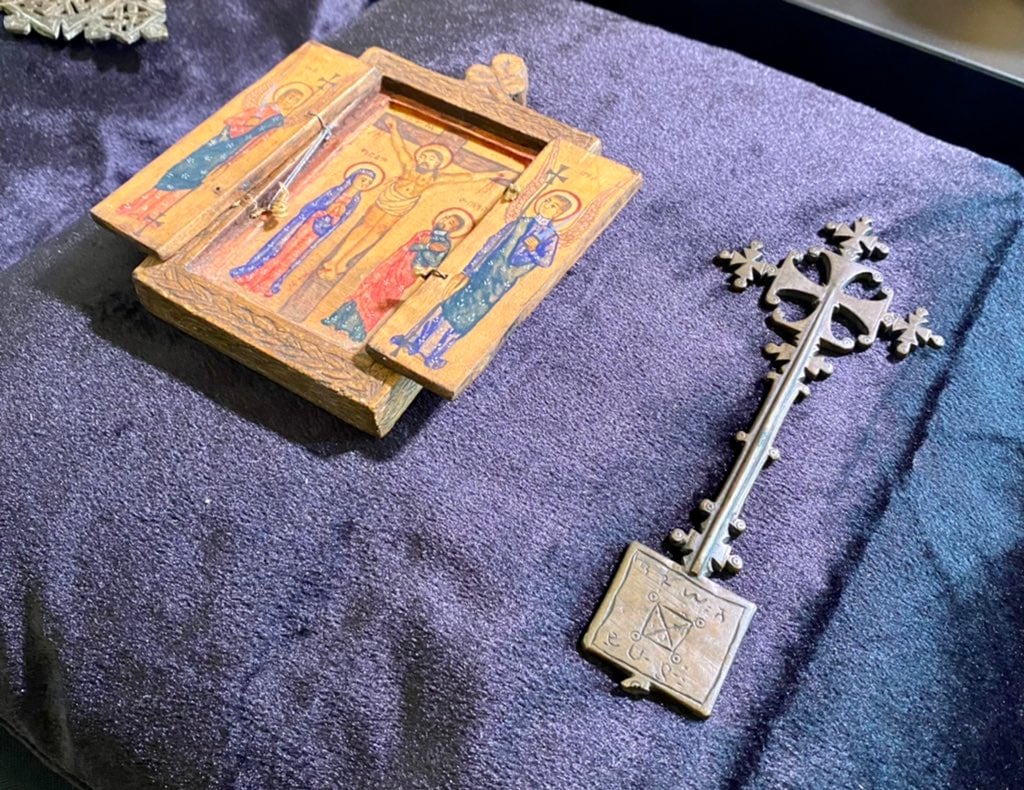
Looted treasure is being returned to Ethiopia over a century and a half after it was stolen by British troops. The Scheherazade Foundation, a British nonprofit, purchased the cache of Maqdala artifacts earlier this summer and turned them over to the Ethiopian ambassador to the U.K. at a ceremony at London’s Athenaeum Club on Wednesday.
The artifacts, which include a handwritten Ethiopian religious text, crosses, and an imperial shield, represent just a handful of the many valuable Ethiopian objects that British soldiers stole following the Battle of Maqdala in 1868. In one fell swoop, the trove almost doubled the number of objects that had been returned since the battle, experts said.
“We are deeply, deeply moved tonight to be handing back to Ethiopia a very small but incredibly significant part of a treasure that was taken by the British 153 years ago,” foundation founder Tahir Shah said at the ceremony. “Our thinking is not to punish the British, but to heal old wounds.” (News of the ceremony was first reported by the Art Newspaper.)
The artifacts will likely join the collection of the National Museum in Addis Ababa, with some of the religious objects potentially going to the Ethiopian Orthodox Church.
“Maqdala was not an adventure, [or] a heroic tale of conquest to fill the pages of a Victorian diary… it was a wound,” ambassador Teferi Melesse said at the ceremony. “This means Maqdala objects, treasures, or artifacts are memoriams. They allow us to mourn and process what we have lost.”
The three horn beakers, with silver plates inscribed “Magdala” and “taken at Magdala” were pulled from auction and are being restituted to Ethiopia. Photo courtesy of Busby.
Shah purchased the artifacts in two groups. A selection of looted Maqdala objects were pulled from the Bridport auction house Busby following complaints from the Ethiopian embassy, and Shah bought them for a few hundred pounds with the intention of restituting them. The second set came from a collector in Brussels and cost a few thousand pounds, according to the Art Newspaper.
“Yesterday’s treasure trove of returned looted artifacts is the single most significant heritage restitution in Ethiopia’s history,” Alula Pankhurst, member of Ethiopia’s National Heritage Restitution Committee, said in a statement. “It is my hope and determination that this will pave the way for further restitution.”
Other prominent Ethiopian artifacts are still held by British institutions, such as the remains of Prince Alemayehu at Windsor Chapel and the Tabot Arks of the Covenant at the British Museum—a situation that is “increasingly anachronistic, irrelevant, and embarrassing,” Pankhurst added.
Today, the Ethiopian government’s position is that all Maqdala artifacts held in the U.K. should be returned. Other countries have also been pursuing the return of objects seized during colonial times, such as the Benin bronzes.
The return of the Maqdala artifacts “may have ramifications for the whole question of cultural repatriation, which is ongoing,” Scheherazade Foundation board member Jason Webster said following the ceremony. Repatriation “is becoming a bigger and bigger matter and more and more people are becoming aware of this.”
See more photos of the artifacts below.
The Scheherazade Foundation has returned artifacts looted in Maqdala in 1868 to Ethiopia. Photo courtesy of the Embassy of the Federal Democratic Republic of Ethiopia, London.
The Scheherazade Foundation has returned artifacts looted in Maqdala in 1868 to Ethiopia. Photo courtesy of the Embassy of the Federal Democratic Republic of Ethiopia, London.
The Scheherazade Foundation has returned artifacts looted in Maqdala in 1868 to Ethiopia. Photo courtesy of the Embassy of the Federal Democratic Republic of Ethiopia, London.
The Scheherazade Foundation has returned artifacts looted in Maqdala in 1868 to Ethiopia. Photo courtesy of the Embassy of the Federal Democratic Republic of Ethiopia, London.
This 18-century Coptic Bible was pulled from auction and is being restituted to Ethiopia. Photo courtesy of Busby.
The Scheherazade Foundation has returned artifacts looted in Maqdala in 1868 to Ethiopia. Photo courtesy of the Embassy of the Federal Democratic Republic of Ethiopia, London.